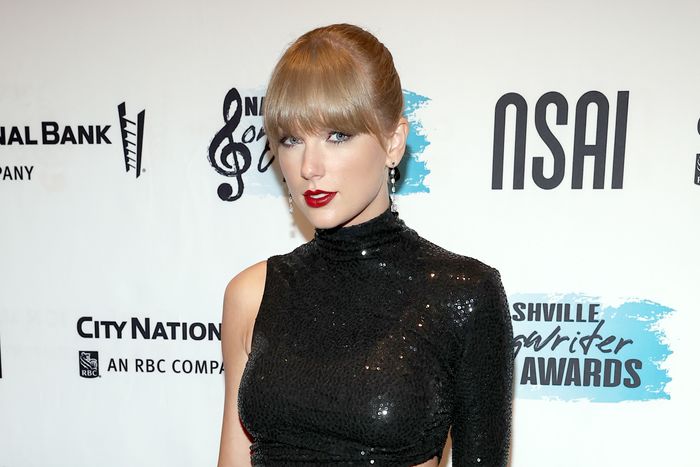
Taylor Swift’s last two new releases, folklore and evermore, felt tucked away from the world, like the visions of snowy cabins they evoked. But if you knew what Swift had been going through, you could pick out the reactive bits — especially as it pertained to the ownership of her music, her cause célèbre of late. “I didn’t have it in myself to go with grace / ’Cause when I’d fight, you used to tell me I was brave,” Swift sang on “my tears ricochet,” seemingly to Scott Borchetta, her former champion who first signed a teenage Swift to his Big Machine label before later overseeing the sale of her catalogue to her chief nemesis, Scooter Braun. Swift’s message to Braun, though, was even clearer: “I’m takin’ my time / Takin’ my time / ’Cause you took everything from me,” she sang on “mad woman.” Still, these songs were cloaked in the fictional haze of that era, far from a direct response.
Things look a bit more obvious on Midnights, Swift’s tenth album. These songs once again exist as points in her world; it’s right there in the premise, with actual sleepless nights spun into lyrics. The allusions to her public life are back in full force, too, from her boyfriend Joe Alwyn to her anxieties to, yes, her famous feuds. The provocatively titled “Vigilante Shit” seems to revisit the Braun-Borchetta drama head-on while also returning to the scorekeeping, revenge-seeking Swift we thought we might have seen the last of during folklore and evermore.
Swift opens by setting her intentions. “Draw the cat eyes sharp enough to kill a man,” she sings, and then adds a few lines later, “They say looks can kill, and I might try.” She’s past the reflections of “mad woman” and onto throwing barbs. On “Vigilante Shit,” the only song on Midnights that she wrote alone, Swift is at her venomous best. “While he was doin’ lines and crossin’ all of mine” is instant-classic Swift wordplay, but it’s what comes after that packs the punch: “Someone told his white-collar crimes to the FBI,” she says, a possible reference to a recent fraud lawsuit against Braun. Elsewhere, she surveys the fallout from her claim on “mad woman” that Braun, now divorced, is a cheat. “Picture me, thick as thieves with your ex-wife,” she taunts after referencing some “cold-hard proof.” But as juicy as the receipts are, they don’t carry the track. As on Swift’s best referential songs, she gives just enough what, when, and where to keep listeners invested while staying focused on the why and how: emotions and conflict.
But on “Vigilante Shit,” that sounds different. Yes, hip-hop Taylor is back (even with a requisite Benz mention), but this time without the sometimes-grating aggression of reputation. Here, Swift’s mode is cooler. She’s not exactly rapping, rather almost speaking her lines over a dark, bassy trap beat that could fit on an action-movie soundtrack. She’s skeptical, almost mocking, when she sings, “Ladies always rise above,” in the bridge, but at the same time, that’s her attitude here. She’s not rising above the drama, but she is carrying herself as the winner. (Braun’s last contribution, meanwhile? A half-hearted statement about his “regret” around the deal.) The fight over her masters had already been a winning issue: Swift came in exponentially more famous and beloved than Braun, her rerecordings have only made her more so, and the idea that an artist should own her music adds up logically and morally. Yet as any rapper can tell you, when a beef is playing out in the public sphere, how you present yourself can be half the battle.
“Vigilante Shit” has its flaws — among them the borderline-nonsensical “I don’t dress for women / I don’t dress for men / Lately I’ve been dressin’ for revenge” hook (which also feels lab-crafted to send Gaylors into a tizzy). But more than being good or bad, it’s another fascinating installment in the chronicles of Swift as a celebrity. “I don’t start shit, but I can tell you how it ends,” she says early in the song. It’s a signature Swift earworm, but it’s also a motto for her celebrity. Swift controls the narrative by wielding her pen. On “Vigilante Shit,” that means ending the beef with a knockout. Let the winner write the history.


